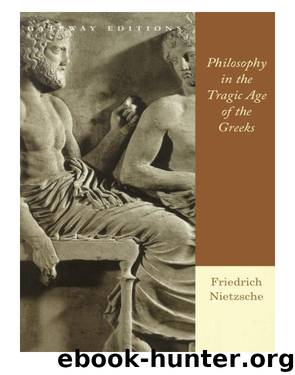Philosophy in the Tragic Age of the Greeks by Friedrich Wilhelm Nietzsche

Author:Friedrich Wilhelm Nietzsche
Language: eng
Format: epub
Publisher: Regnery Publishing
Published: 2012-03-10T05:00:00+00:00
Nonetheless Heraclitus has not escaped the “barren minds”; already the Stoics re-interpreted him on a shallow level, dragging down his basically esthetic perception of cosmic play to signify a vulgar consideration for the world’s useful ends, especially those which benefit the human race. His physics became, in their hands, a crude optimism with the continual invitation to Tom, Dick and Harry to plaudite amici.
8
Heraclitus was proud, and when a philosopher exhibits pride, it is a great pride indeed. His activities never directed him toward any “public,” toward any applause from the masses or toward the encouraging chorus of his contemporaries. To walk alone along a lonely street is part of the philosopher’s nature. His gift is the rarest gift of all, the most unnatural one in a certain sense, exclusive and hostile even toward others with similar gifts. The wall of his self-sufficiency must be built of diamonds if it is not to be destroyed and broken into, for everything and everyone is in league against him. His journey toward immortality is more difficult and burdensome than that of other men. And yet no one can believe more firmly than the philosopher that his journeying will lead to the goal, for where could he stand but on the wide-spread pinions of all time. A lack of consideration for what is here and now lies at the very core of the great philosophical nature. He has hold of truth: let the wheel of time roll where it will, it can never escape truth. It is important to find out from such people that they once existed. Never, for example, could one imagine such pride as that of Heraclitus, simply as an idle possibility. Looked at from a general point of view, all striving for insight seems, by its very nature, forever dissatisfied and unsatisfactory. No one will believe, therefore, in such regal self-esteem and calm conviction that he is the only rewarded wooer of truth, except by the instruction of history that such a man did once exist. Such men live inside their own solar system; only there can we look for them. A Pythagoras, an Empedocles too, treated himself with an almost super-human esteem, almost with religious reverence, but the great conviction of metempsychosis and of the unity of all life led him back to other human beings, for their salvation and redemption. The feeling of solitude, however, that pierced the Ephesian hermit of the temple of Artemis, we can intuit only when we are freezing on wild desolate mountains of our own. No all-powerful feeling of compassionate emotions, no desire to help, to heal, to save, stream forth from Heraclitus. He is a star devoid of atmosphere. His eye, flaming toward its inward center, looks outward dead and icy, with but the semblance of sight. All around him, to the very edge of the fortress of his pride beat the waves of illusion and of wrong-ness. Nauseated, he turns from them. But other men, too, those with feeling hearts, turn away in turn from such a mask, cast as it were in brass.
Download
This site does not store any files on its server. We only index and link to content provided by other sites. Please contact the content providers to delete copyright contents if any and email us, we'll remove relevant links or contents immediately.
| Anthropology | Archaeology |
| Philosophy | Politics & Government |
| Social Sciences | Sociology |
| Women's Studies |
The remains of the day by Kazuo Ishiguro(7540)
Tools of Titans by Timothy Ferriss(6934)
The Black Swan by Nassim Nicholas Taleb(6182)
Inner Engineering: A Yogi's Guide to Joy by Sadhguru(5886)
Giovanni's Room by James Baldwin(5870)
The Way of Zen by Alan W. Watts(5787)
The Six Wives Of Henry VIII (WOMEN IN HISTORY) by Fraser Antonia(4784)
The Power of Now: A Guide to Spiritual Enlightenment by Eckhart Tolle(4747)
Astrophysics for People in a Hurry by Neil DeGrasse Tyson(4613)
Asking the Right Questions: A Guide to Critical Thinking by M. Neil Browne & Stuart M. Keeley(4564)
12 Rules for Life by Jordan B. Peterson(3722)
The Ethical Slut by Janet W. Hardy(3494)
Skin in the Game by Nassim Nicholas Taleb(3455)
Housekeeping by Marilynne Robinson(3395)
The Art of Happiness by The Dalai Lama(3376)
Double Down (Diary of a Wimpy Kid Book 11) by Jeff Kinney(3267)
Skin in the Game: Hidden Asymmetries in Daily Life by Nassim Nicholas Taleb(3259)
Walking by Henry David Thoreau(3227)
12 Rules for Life: An Antidote to Chaos by Jordan B. Peterson(3195)
